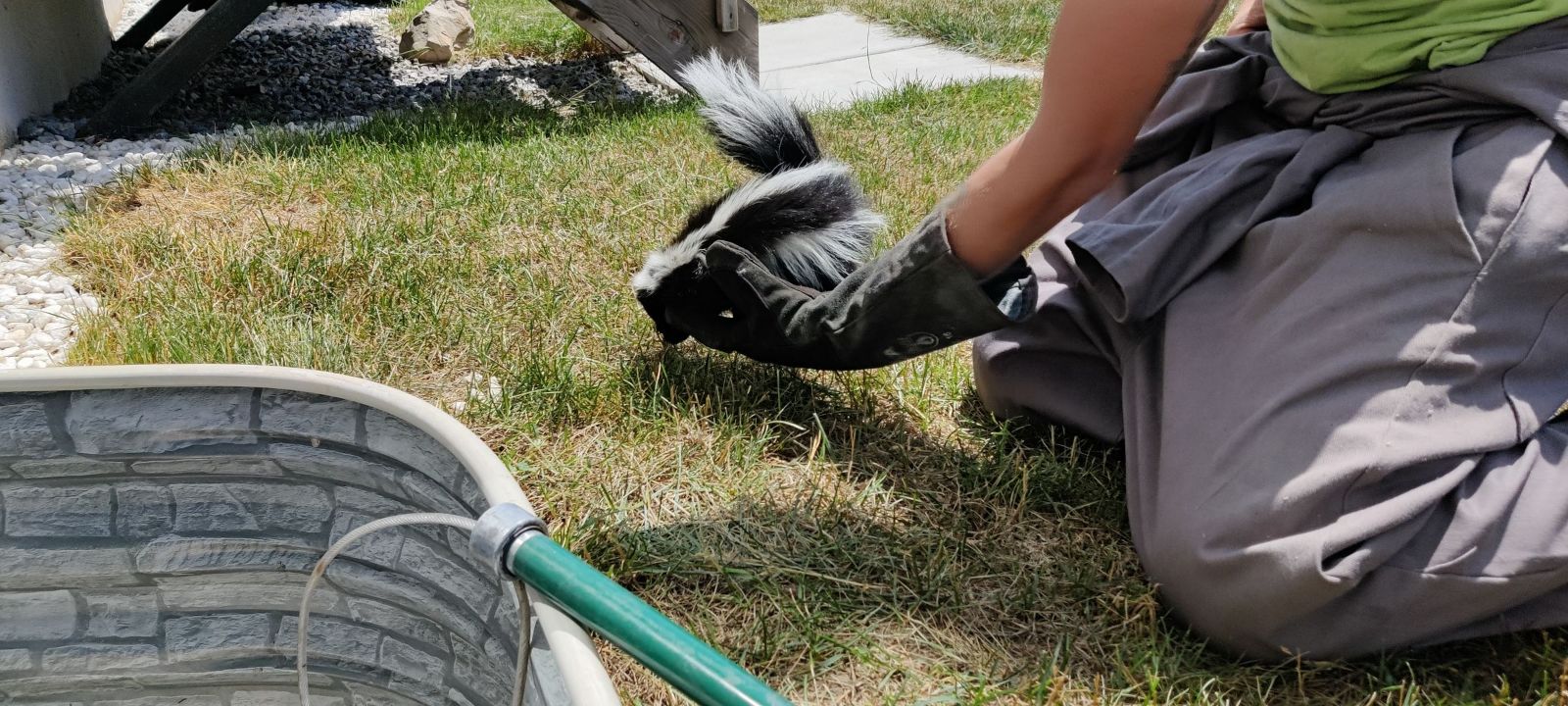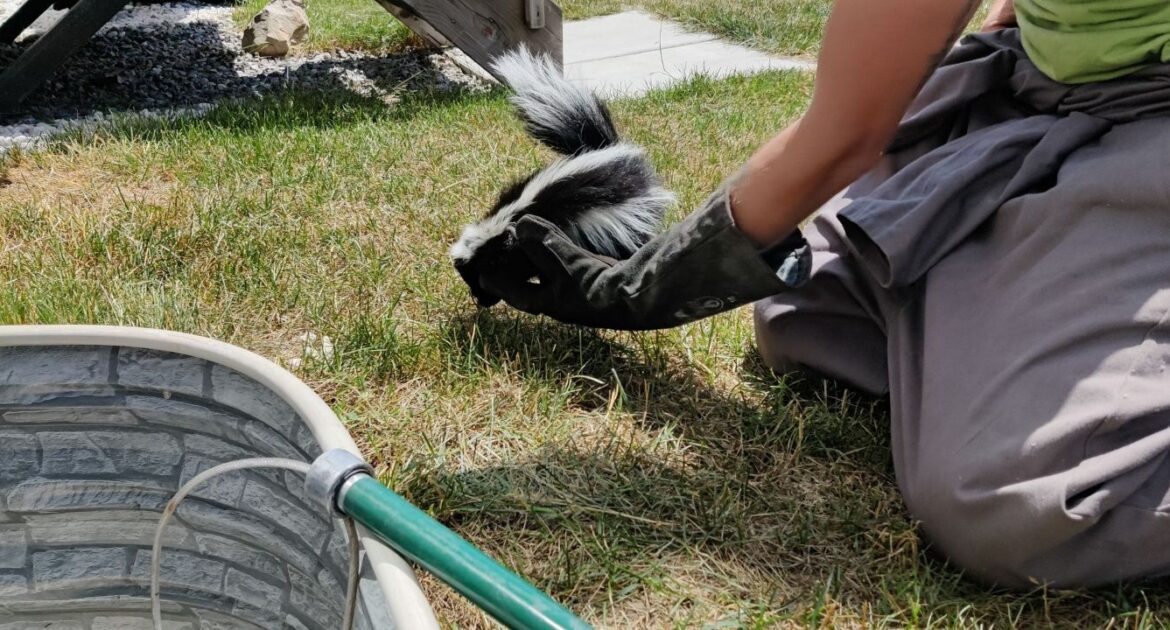Have you noticed a furry visitor with a strong smell hanging around your property? It’s probably a skunk, and it’s no surprise if you’re wondering why it’s taken a liking to your place. Skunks are creatures of habit, mainly driven by their search for food. If you’ve seen one nosing around, it’s likely attracted by the scent of insects, grubs, or even leftovers in your trash cans.
While they don’t intend to move in permanently, their visits can be quite the smelly ordeal. That’s where Skedaddle’s professional wildlife removal services in Toronto come in handy. Without proper intervention, these striped foragers might decide your home is the perfect spot for their food hunts.
No need to stress; our expert team can safely and humanely handle the situation, ensuring your space is no longer on their radar.
Skunk Habits
At a glance, skunks are intriguing creatures with a distinct appearance and unique behaviour. Despite their lack of popularity among humans, they fulfill an essential role in the ecosystem. However, when they start frequenting urban areas, it’s typically due to several enticing factors.
These animals are nocturnal creatures, preferring to roam at night, which is why they’re often first detected when homeowners notice disturbances in their garbage cans or late-night rustlings. These furry creatures have a keen sense of smell, which they rely on heavily, making your kitchens and yards a smorgasbord of opportunity. Their burrowing nature also means they look for shelter, and your home provides the perfect mix of food and safety.
Skunks are omnivorous, which essentially means they’ll eat just about anything! Their diets primarily consist of insects, small rodents, grubs, fruits, vegetables, and even pet food. Your home’s compost bin or unsealed garbage can be a goldmine, drawing them closer to your house in search of easy meals.
When skunks find themselves near human dwellings, they often discover an abundance of food that is easily accessible—e.g., pet dishes left outside, open garbage cans, or holes in gardens that are filled with grubs and earthworms. Additionally, your home’s structure may provide an inviting den site to raise their young.
Dangers and Discomforts of a Close Encounter
While skunks are typically docile and prefer to avoid confrontation, that doesn’t mean you should underestimate the risks they can pose.
The most infamous skunk feature, their smell, is a potent defence mechanism that they’ll use when they feel threatened. A skunk spray can cause temporary blindness, and the smell can linger for days, becoming hard to remove from pets, clothes, and the areas it was sprayed.
Skunks can carry diseases harmful to both humans and pets. Rabies, for instance, is a concern in some areas, requiring caution if pets or strays interact with skunks. Additionally, the presence of a skunk within your home’s foundation or other critical structures can lead to damage, as well as an unpleasant odour that can permeate through the home’s vents and foundations.
A skunk living within the vicinity of your home can restrict your outdoor activities or enjoyment of your property, particularly in the evening. The potential for surprise encounters or the mere possibility of being sprayed can create a tense and uncomfortable atmosphere.
Skunk in the City: How Urbanization Affects Wildlife
With cities expanding, natural habitats for skunks and other wildlife have diminished. Our homes, yards, and neighbourhoods now share the environment and resources once purely the domain of creatures like skunks. This proximity can lead to conflicts, and for skunks, our urban environment has some significant benefits.
The variety of food in urban areas is much richer than what skunks would find in a forest. Along with actually tastier, easier-to-reach foods like trash and pet food, there are bigger, more fulfilling meals in the form of rats and other pests commonly found near human habitations.
Toronto homes offer warm, secure places for skunks to raise their young. Unfortunately, this might be a structure’s crawlspace, beneath a deck, or even the unattended attic. It’s a great offer from the skunk’s point of view.
In Toronto, skunks don’t have to contend with the same level of predation as they would in the wild, where they’re hunted by animals such as owls, foxes, and coyotes. This reduction in threats means skunks can roam more freely and in greater numbers, contributing to higher urban wildlife populations.
Skunk Sights: Identifying Their Activities on Your Property
Spotting a skunk during the day is unusual, so clues to their presence often come down to their activities at night. Identifying these signs can help confirm a skunk problem.
Skunks, like other nocturnal animals, are most active when you’re least likely to see them. Hearing or observing them knock over trash cans or dig in your yard under the cover of darkness suggests they might be the culprits for these disturbances.
An unusual hole under your porch or shed is a cause for investigation. If you observe a skunk entering and exiting this space, it’s likely their home, and there may be more than one skunk present—females often take in a male to protect their young.
While skunks typically are not destructive, their seeking shelter can lead to problems. Burrows beneath foundations can cause structural issues, and the used den spaces can get quite dirty, not to mention the potential for skunk scent to permeate into your home.
What to Do When a Skunk Has Picked Your Place
Once it has been established that you have a skunk frequenting your property, it becomes essential to address the problem effectively and responsibly. At this point, it’s time to seek professional wildlife control services, like the ones offered by Skedaddle.
Professional Wildlife Control in Toronto
Skedaddle has been on the forefront of humane wildlife removal for over 30 years. We are staffed with experts who specialize in identifying, removing, and preventing the return of skunks and other wildlife from your home. Our techniques are humane, and we employ prevention methods that ensure the issue is resolved long-term.
What to Avoid
Attempts to remove skunks yourself can be dangerous and are not recommended. DIY removal methods such as traps or poisons can lead to injuries, improper disposal of wildlife, or expose you to the risk of being sprayed.
Choose Skedaddle for Wildlife Removal in Toronto
Selecting Skedaddle means choosing experience, expertise, and a commitment to humane practices. Our technicians are skilled in wildlife biology and can provide a tailored solution to your specific wildlife issue. We also offer comprehensive services that include repairing the damages caused by skunks and protecting your home against future invasions.
Once Skedaddle has removed the skunk, it’s essential to take steps to make your property less appealing to future wildlife. This might involve securing trash cans, cutting off access to burrowing sites, or scheduling routine inspections to catch issues before they escalate.
A skunk’s presence around your home is far more than just a smelly nuisance. It’s an indication of a wider issue—our shared environment with urban wildlife—and a call to action to manage this interaction responsibly. By understanding what draws skunks to our homes and choosing the right professionals to handle them, we protect our households, our pets, and the skunks themselves.
If you’re facing a skunk problem or any other wildlife issue, don’t hesitate to reach out to Skedaddle. We’re here to help you coexist with the natural world safely and comfortably. Take control of your home and your peace of mind by calling us today.





